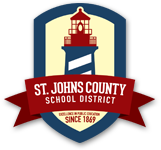For the most up-to-date registration information, please visit the district website at: www.stjohns.k12.fl.us/student/enrollment.
Disclosure Requirements Prior to Enrollment
Each parent/guardian, at the time of initial registration for school placement, must note previous school expulsions, arrests resulting in a charge, arrests pending, and juvenile justice actions the student has had. Schools have the authority to honor the final order of expulsion or dismissal of a student by any in-state or out-of-state public district, private school, or lab school, for an act which would have been grounds for expulsion according to the SJCSD Code of Student Conduct.
SJCSD, will enforce the following:
- A final expulsion order shall be recorded in the records of the receiving school.
- The expelled student applying for admission to the receiving school shall be advised of the final order of expulsion.
The superintendent or designee may recommend to the School Board that the final order of expulsion be waived, and the student be admitted to the school district, or that the final order of expulsion be honored, and the student not be admitted to the school district. If the student is admitted by the School Board, with or without the recommendation of the district school superintendent, the student may be placed in an appropriate educational program at the direction of the School Board.
For more information regarding registration and placement, please see the grade band or specific program heading in the Table of Contents.
Dependent Children of Active-Duty Military Personnel
Dependent children of active-duty military personnel moving into the district outside of normal application periods who otherwise meet the eligibility criteria for special academic programs shall be given special consideration for admission to such programs even if the program is being offered through a school other than the student’s home zoned school. Special programs include, but are not limited to, the following programs of interest: International Baccalaureate (IB), Advanced International Certificate of Education (AICE), career academies and JROTC programs. 1000.36 F.S.
Students with Disabilities Enrolled in Exceptional Student Education (ESE)
Students with disabilities shall be placed in appropriate courses as dictated by their Individual Education Plan (IEP). Specially designed instruction will be provided by an ESE teacher or other service provider in the Least Restrictive Environment (LRE) as determined by the IEP team. In most cases, this will be in the regular education classroom with their non-disabled peers, but some ESE students may require instruction in a separate environment for some portion of the day.
See the Exceptional Student Education section in the table of contents for more information.
School-to-School Placement
Whenever grade level placement of a student involves a movement from one school to another school, the processing of that movement shall begin with the Intervention Team or its equivalent of the sending school and end with the principal, or designee, of the receiving school. The receiving principal shall do the following:
- review the recommendation,
- conduct investigative activities as deemed necessary,
- render a decision, and
- notify those who have a need to know.
The referring school shall have tried interventions prior to seeking placement of a student in another school. Such interventions will be briefly described on the referral form. A student entering late is an exception to this requirement. Parents/legal guardians shall be invited to attend any meeting discussing school-to-school placement.
Pregnant, Married or Parenting Students
Students who are married and students who are pregnant shall not be prohibited from attending school. These students shall receive the same educational instruction or its equivalent as other students but may voluntarily be assigned to a class or program suited to their special needs. Pregnant or parenting teens may participate in a teenage parent program. Pregnant students may attend alternative education programs or adult education programs, provided that the curriculum allows the student to continue to work toward a high school diploma.
Classroom Teacher Change in Placement
Florida Statute 1003.3101 gives a parent/legal guardian the right to request his or her child be transferred to another classroom teacher based on (1) the teacher’s out-of-field certification status or (2) personal preference. This statute does not give the parent/legal guardian the right to choose a specific classroom teacher. Teachers with out-of-field certification are named on our district website 30 days before the beginning of the semester.
Parents/legal guardians may complete a Teacher Change Request Form, which is also available on the district website and at schools. When the form is returned to the school, the parent/legal guardian will be contacted to schedule a conference (required). After the conference, the principal will either approve or deny the request with the rationale for the denial in writing. Schools must approve or deny the transfer within two weeks of receiving the request. Consistent with school board rules and in accordance with state statute (1012.28 (5) F.S.), the Superintendent has designated the principal of the school as the final authority in the placement of students in programs or classes.
Placement in Intensive Reading
For each year in which a student scores at Level l or 2 on the Florida Assessment of Student Thinking (F.A.S.T) in English Language Arts (ELA), the student may be enrolled in an Intensive Reading (IR) course the following year or a content-area course in which reading strategies are delivered based on a diagnosis of the student’s specific reading needs. Intensive Reading courses shall be designed and offered pursuant to the District’s Comprehensive Reading Plan (CRP).
Please refer to the section on reading support in this document and to the CRP at http://www.stjohns. k12.fl.us/cs/crp/.
Students reading below grade level will be eligible for two tiers of reading support. Eligibility will be determined by each school’s collective evaluation of data which could include, but is not limited to, the following:
- FAST ELA Reading score
- Progress monitoring tools
- Class grades, formative and summative assessments
- Teacher recommendation or anecdotal evidence
- The following instructional assistance options are available for 11th and 12th grade students who have not achieved a level 3 on the Florida Assessment of Student Thinking (FAST) 1003.1003.433 F.S.433 F.S.:
- FAST math/reading support at their school of enrollment,
- Participation in an accredited high school equivalency diploma preparation program during the summer,
- Or participation in an adult general education program.
Honors or Advanced Course Placement Criteria- Secondary
The St. Johns County School District criteria for honors or advanced course placement are any one of the following:
- Grades – A grade of a C or better in the previous honors course or a grade of an A in the previous standard level course
- FAST – Level 4 or 5 in appropriate area and not less than a level 3 in any area
- on Mathematics FAST for placement in honors mathematics classes
- on Reading FAST for placement in honors English, social studies and science or foreign language honors placement
- Norm Referenced Test – Stainine of 7, 8, or 9 on an appropriate assessment
- Math score for placement in honors mathematics classes
- Reading score for placement in honors English, social studies and science or foreign language honors placement
Please Note: Students with level 1 or 2 on their ELA- FAST will be placed in courses that provide targeted or intensive reading interventions and the students may not qualify for an honors level course.
Academic performance and teacher recommendation may be considered in student placement. Consistent with school board rules and in accordance with state statute [1012.28(5)F.S.], the Superintendent has designated the principal of the school as the final authority in the placement of students in programs or classes.
It is important to understand the content of advanced math courses when considering acceleration by “skipping” any sequential math course. The Florida mathematics standards are designed as a progression of learning from one grade level to another. If a student “skips” any of the math standards as part of a math course, these topics are not taught again but are foundational for higher level mathematics courses. Therefore, students given the opportunity to choose this progression will be given district developed supplemental summer work on the “skipped” content to be completed before entering the appropriate advanced math course enrolled in the fall of the upcoming school year.
Academic performance, summer work, FAST/EOC scores and teacher recommendation may be considered in student placement. Student placement is at the discretion of the principal. Consistent with school board rules and in accordance with state statute [1012.28 (5) F.S.], the Superintendent has designated the principal of the school as the final authority in the placement of students in programs or classes.
Homeless Students
The federal McKinney-Vento Homeless Assistance Act, as amended by the, Every Student Succeeds Act (ESSA), ensures that each homeless child and youth has equal access to the same free, appropriate public education, including a public preschool education, as other children, and youth. Homeless children and youth must have access to the educational and other services that they need to enable them to meet the same challenging academic achievement state standards, to which all students are held. In addition, homeless students may not be separated from the mainstream school environment based on homelessness alone.
Children and youth who lack a fixed, regular, and adequate nighttime residence are considered homeless. If, due to a loss of housing, a child must live in a shelter, motel, vehicle, or campground, on the street, in abandoned buildings, or doubled-up with relatives or friends, then he/she is eligible to receive services provided under the McKinney-Vento Act.
A homeless student shall be permitted to enroll immediately, even if the student is unable to produce records normally required for enrollment. This includes, but is not limited to, records such as previous academic records, medical and immunizations records, and proof of residency. A homeless child shall be granted a temporary exemption from entrance requirements for 30 school days, per Florida law.
Under McKinney-Vento, children (PreK-12) have the right to:
- Continue to attend the school they last attended before they lost their housing (school of origin), if that is the parent/guardian’s choice and is in the child’s best interest, or the school which is zoned for their temporary residence.
- Enroll and attend classes immediately while the school arranges for the transfer of school and immunization records and other required enrollment documents.
- If necessary, enroll and attend classes in the school selected by the parent/guardian (school of origin or zoned school), while the school and the parent/guardian seek to resolve a dispute over which school is in the best interest of the child – NOTE: This does not mean any school in the district, only the school of origin or zoned school.
- Receive transportation to the school of origin (if a parent/guardian requests such transportation).
- Participate in any school programs and receive any school services for which they qualify.
For detailed information, see www.stjohns.k12.fl.us/homeless.


